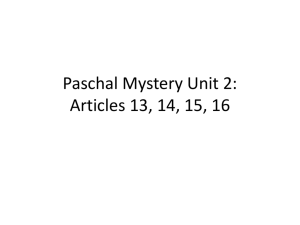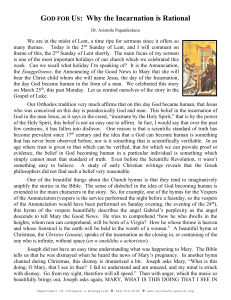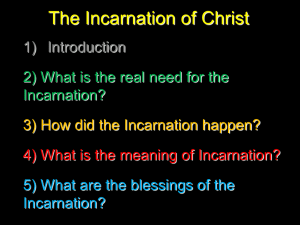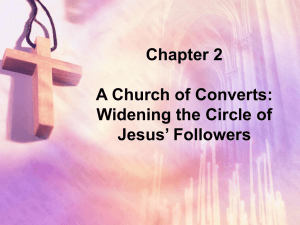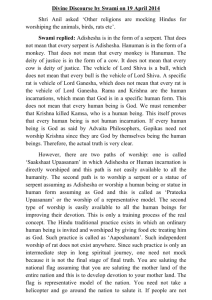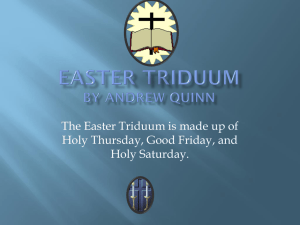Jesus: the Definitive Revelation of God
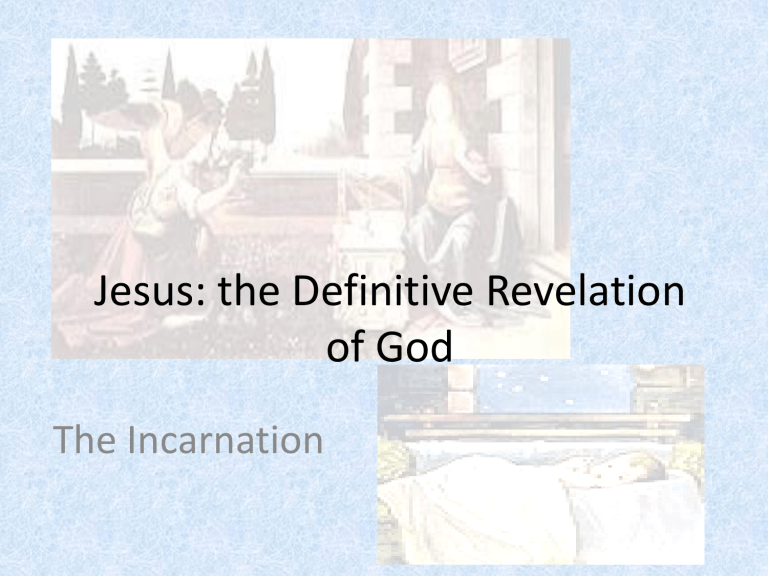
Jesus: the Definitive Revelation of God
The Incarnation
What is the Incarnation
•
The second person of the Trinity assumed a human nature to accomplish our salvation
•
Achieved by the “power of the Holy Spirit”
•
Pre-existent
– From eternity- Son of God
– Earthly existence begins at conception- Son of
Mary
• Immaculate Conception
Mary’s Role
– God honors Mary by granting her freedom from original sin. We celebrate this honor on Dec. 8
• Annunciation
– Mary is asked through the angel Gabriel to become the mother of
Jesus (spiritually she is the mother of us all) Celebrated March 25
• Fiat
– Mary’s answer to submit to God’s will. By becoming the Mother of
Jesus, she becomes the Mother of God. The “Theotokos”, bearer of
God
• Perpetual Virginity
– Mary remains a virgin throughout her whole life
– What about Jesus’ brothers and sisters
• Assumption
– God save Mary from the decay of death by bringing her body to heaven at the moment of her death. Celebrated Aug.15
-
The Word Made Flesh
•
God had prepared humanity for the
Incarnation
– God’s self revelation throughout Old Testament history prepared humanity for his ultimate revelation, his Son, and for the development of the church
•
Fulfillment NOT replacement
– Jesus’ Incarnation does not replace the promises made to the chosen people. It fulfills those promises
The Union of God and Humanity
• Jesus, the Revealer and the Mediator
– Jesus becomes the ultimate revelation of God. He repeats several times that to know him is to know the Father
– The human face of God among us
• Sharing the Divine Love
– Because Jesus shared our life we can share his divine life
– We are united with God through our baptism, Eucharist and the other sacraments
– We are invited to cooperate with God’s will in our lives and participate actively in our salvation
– WE are invited to share the “Beatific vision” after our death
– Jesus became man so that we may become God
Review Questions
• What is the Incarnation?
• What is the significance of the Incarnation for us?
• What is Mary’s role in the Incarnation?
• Define “Theotokos” and explain the significance of the term.
• Jesus comes to fulfill not replace the Law. What does this mean?
• Describe 2 unique roles that Jesus, as god made flesh, fulfills.
• What does it mean that we are able to share in the divine life of God?
1. What is the Incarnation?
The Incarnation refers to the mystery in which the Son of God assumed human nature, or became flesh, to bring about our salvation. It is the mystery of the union of divine and human natures in the Second Divine Person of the Trinity, the Word of God.
2. What is the significance of the Incarnation for us?
The Incarnation is key to our Christian faith. The Son of God became flesh so that he could save us from sin and death. The Incarnation fulfilled God’s covenant with the people of Israel and all humankind by making God’s Word fully and uniquely present as Jesus Christ, the
Word Made Flesh.
3. What is Mary’s role in the Incarnation?
To become human, the Son of God needed to be born from a human mother. Mary was conceived without Original Sin, redeemed from her first moment of life, as part of God’s plan for the Incarnation. She remained sinless throughout her life.
Saying yes to God’s plan, she allowed the Holy Spirit to conceive Jesus in her womb.
4. Define Theotokos and explain the significance of this term.
Theotokos is the Greek word for “Mother of God.” Mary is the mother of Jesus Christ. Jesus is God, the Second Divine Person of the Trinity. Therefore the Church has given Mary the title of
Mother of God.
5. Jesus comes to fulfill, not to replace, the Law God gave to the
Israelites. What does this mean?
God gave his Law to the Israelites to prepare them for his ultimate self-revelation in the Incarnation of the Word and in the development of his Church. Jesus explains that he was sent not to abolish this law but to fulfill it. He was sent to reveal the saving purpose of the Law and to redeem the sins that God’s people had committed against it.
But God’s covenant with the Jewish people remains active, and the
Law that was part of this covenant also remains valid. God’s fidelity to his people endures forever.
6. Describe two unique roles that Jesus, as God Made Flesh, fulfills.
Jesus fulfills the roles of revealer and mediator. He serves as a revealer because he reveals God the Father to us. That is, as the Divine Son of the Father, Jesus allows us to see the human face of God. Jesus is also the sole mediator between us and God, making God available to us even after we lost his friendship through sin.
